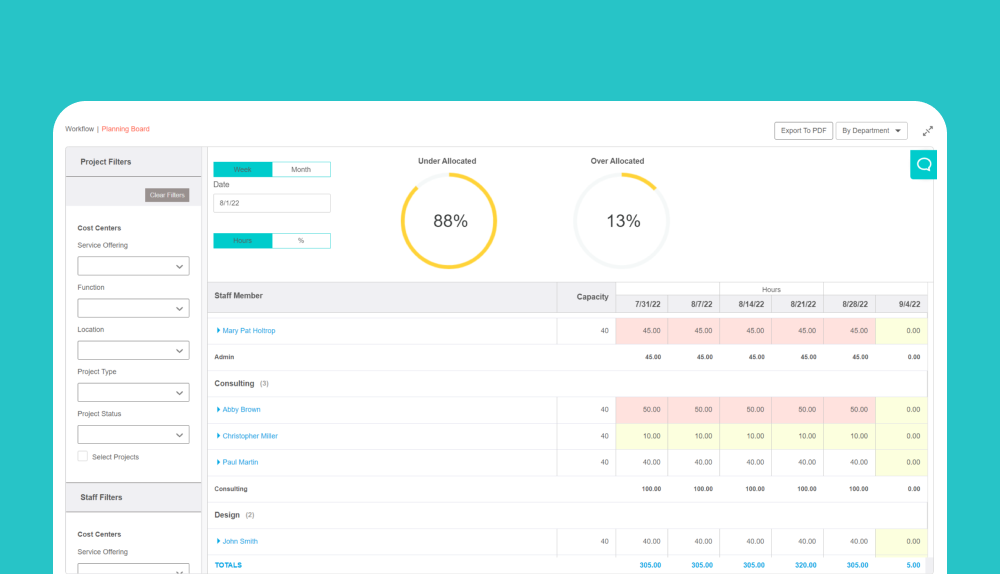Let’s be honest — no one wants to work overtime on short notice.
If this is happening all too often, your business might have some problems with overutilization.
Definition of Overutilization
Overutilization refers to a situation where a company or organization excessively utilizes its resources, assets, or capacities beyond sustainable or optimal levels.
In the services industry, overutilization usually refers to having too few employees to complete the tasks planned in a project schedule. However, it can also occur in various aspects of a business, including production, operations, and finance.
The Impact of Overutilization
While it may seem counterintuitive, overutilization can lead to negative consequences rather than improved efficiency or productivity.
Forcing employees to work more than they should can only help the business in the short term. When repeatedly asked for overtime, employees tend to become overworked, and can even lose their trust in the management skills of their supervisors. As a result, the quality of their work drops, and so do the chances of the project being successful.
Types of Overutilization
While the term overutilization is most commonly used in resource management, it can be applied to more than just people.

The most common overutilization types include:
- Production overutilization: When a manufacturing facility operates at maximum capacity for an extended period without sufficient downtime, it can result in equipment breakdowns, increased maintenance costs, and reduced product quality.
- Employee overutilization: Demanding that employees work excessively long hours without adequate rest or work-life balance can lead to burnout, decreased productivity, and high employee turnover.
- Financial overutilization: Constantly relying on debt to finance business operations without a sustainable repayment plan can lead to financial instability, higher interest expenses, and potential bankruptcy.
- Resource overutilization: Utilizing scarce resources or raw materials at unsustainable rates can lead to shortages, increased costs, and environmental issues.

Main factors That Cause Overutilization
Several factors can contribute to overutilization in a business. These factors may vary depending on the industry, company size, and specific circumstances, but some common causes include:
High Demand
When a business experiences rapid growth or faces unexpectedly high demand for its products or services, there might be a temptation to push resources to their limits to meet customer needs. While growth is generally positive, it might cause a higher turnover rate when it’s achieved at the expense of valued specialists who did not sign up for overtime.
Poor Resource Management
Inadequate monitoring and control of resources can result in overutilization. Without proper resource usage tracking, businesses may not realize when they exceed sustainable levels. As a result, they become prone to schedule conflicts and, consequently, stressful situations affecting staff morale.
Lack of Planning and Forecasting
Many companies plan their work in 1 or 2-week sprints intended to address the most pressing issues or critical tasks. However, by doing so they often fail to forecast demand, resource requirements, and capacity needs, leading to sudden surges in demand that strain resources and cause overutilization.
Inadequate Staffing
When a company acquires a new project, it might simply not have the right people for the job. This understaffing can lead to existing employees being overburdened with work, causing overutilization and burnout.
Unrealistic Goals
Every project has its ups and downs. However, when improperly evaluated in terms of required skills or capacity, a simple project might turn into unbearable overutilization. That is why preparing a detailed project scope is so important; without it, not only the project but also its profitability can be in jeopardy.
How to Avoid the Overuse of Resources
Avoiding overutilization of resources in business is essential for maintaining efficiency, productivity, and sustainability. That’s why project managers should pay more attention to:
Strategic Planning and Forecasting
Take a look at the more distant future of your company before it comes chasing you and your overworked employees. Develop comprehensive business plans that include accurate resource forecasting, requirements, and capacity needs. By anticipating future needs, you can adjust your resource allocation accordingly and avoid sudden spikes in utilization.

Efficient Resource Management
Implement systems and processes to track and manage resource usage effectively. Regularly monitor resource availability, identify inefficiencies, and make necessary adjustments to optimize resource utilization.
While working on project scheduling itself, pay attention to any overlapping allocations or capacity shortages. If you feel like it is simply not possible to do in Excel, invest in resource management software that will inform you anytime you try to exceed an employee’s capacity.
Workload Management
Whenever you feel like your plans are getting further and further away from reality, use workload management processes to change that. This will help you ensure that you are distributing workloads evenly among employees and departments while avoiding overburdening certain individuals or teams, as this can lead to burnout and decreased productivity.
Flexibility and Scalability
Don’t assume that an Excel spreadsheet will be enough to plan your team’s work forever. As the number of employees in your company grows, your tables will become more and more complicated, resulting in wasted time and more planning mistakes. Under such circumstances, it is better to choose a tool capable of designing your business processes and infrastructure to be flexible and scalable. This way, you can adapt to changes in demand without straining your resources excessively.
Real-Time Collaboration
When different information is stored in different locations, it’s difficult to have everyone on the same page. That’s why your company and its tools need to promote collaboration and constant exchange of information — preferably in a designated system. This can lead to better coordination and resource allocation, preventing duplication of efforts and unnecessary resource usage.





